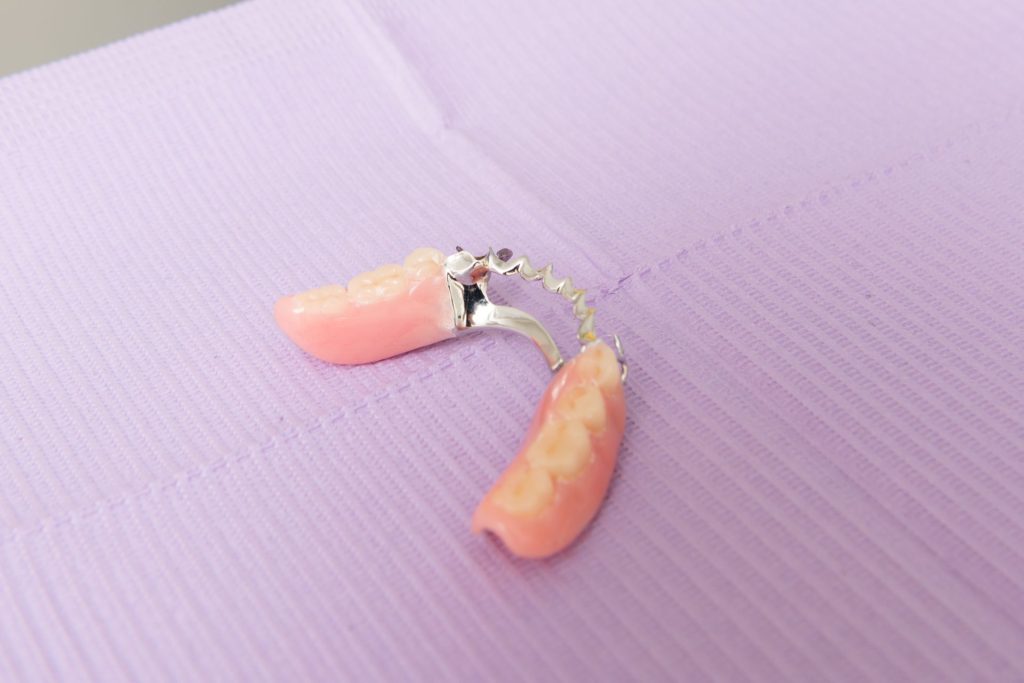
Smile confidently with natural-looking dentures
Dentures are an excellent cost-effective solution when you need to replace multiple missing teeth. Dentures have been around for a long time, but thanks to advanced dental technology, they now look more like natural teeth than they ever have and provide maximum functionality. They’re custom fitted to your mouth, so you can wear them in complete confidence and comfort. They’re also incredibly easy to maintain, so you don’t have to spend hours conducting rigorous cleaning.
Apart from the pros mentioned above they have several cons that include the fact they don’t feel like teeth in the way dental implants do, they put extra pressure on your remaining teeth and they may require you to alter your diet because of their functional limitations.
If you’re interested in getting dentures, book an appointment with our expert dental team at our Castle Hill dental surgery. Our dentists are highly qualified and have extensive experience fitting partial and complete dentures.
What are dentures?
Dentures are removable fake teeth (although they certainly don’t look fake!) that are a substitute for dental implants and dental bridges when replacing missing teeth. There are two types of dentures: full and partial dentures. Below, you can find more details on the two types of dentures:
Full dentures
A full denture replaces entire rows of missing teeth on your upper jaw and lower jaw. If you’re missing most of your teeth, a full denture can be a great option for returning functionality and confidence to your smile. While these dentures can replace your missing teeth, some patients eventually resort to dental implants, as full dentures have the possibility of shifting during daily activities. You might use removable dentures as an interim solution before swapping to implant-supported dentures. This is because dentures don’t feel like original teeth and you can lose the texture sensation of food when you eat.
Partial dentures
A partial denture only replaces several missing teeth rather than an entire row. We offer two variations of partial dentures, which you can explore below:
Cast metal frame dentures
This type of denture involves a precision-cast metal frame that creates an exact fit. It’s important to keep in mind that this type of denture requires the surrounding teeth to be healthy and structurally supported by a healthy jaw. If you get a cast metal frame denture, visiting our Castle Hill dental clinic for regular check-ups to keep your denture and your surrounding teeth in tip-top condition is very important.
Acrylic dentures
If you’re after a cost-effective solution, acrylic dentures may be a good choice. These dentures don’t offer the same level of support as cast metal frame dentures, but may be a good choice if your surrounding teeth require dental treatment. They can also be a suitable interim solution before you choose to receive dental implants.
Do I still need to visit the dentist if I have dentures?
There’s a slight misconception that having dentures means you don’t have to visit the dentist anymore. It’s still important to maintain regular dental check-ups. Your dentist can ensure your dentures are still fitting well and not causing any discomfort. If dentures are ill-fitting, they can speed up jaw bone loss. So, checking the fit and bite is important in stopping this. You can also check the condition of your oral health to ensure the dentures aren’t causing irritation, particularly from fungal infections or trauma, causing ulcerations.
While dentures are relatively easy to clean, it’s still a good idea to have them professionally cleaned every 12 months, as retentive plaque and tartar can contribute to oral infections. In extreme cases, oral cancer can develop from traumatic irritation caused by dentures or a culmination of other past habits, including smoking and irregular dental treatment, which dentures may hide.
How to care for dentures
The process for maintaining your dental prosthetist is quite simple. Below, you can find some details on how to clean, store and maintain your dentures:
Cleaning dentures
Like natural teeth, dentures attract plaque, become stained and collect food. It’s important for your oral health that you remove and clean them daily. You can clean dentures with a soft toothbrush or denture brush, along with soap. It might seem like toothpaste is the logical cleaning agent, but it’s abrasive and can scratch dentures, which can increase plaque build-up and staining.
As a precaution, when cleaning your dentures, fill the sink or basin with water or place a washcloth at the bottom. This prevents the denture from breaking should you accidentally drop your dentures. It’s also a good idea to clean your gums under your dentures to remove food debris and bacteria and provide stimulation for the tissues.
Here is a simple step-by-step guide for cleaning your dentures:
- fill a sink with water or place a washcloth at the bottom of the sink
- remove dentures
- clean dentures and wash with regular soap
- clean gums with a soft toothbrush
- clean remaining teeth with a soft toothbrush and fluoride
- store dentures in water overnight.
Storing and maintaining dentures
It’s typically best practice to remove your dentures and leave them out of your mouth every night. This provides the soft tissues with relief and keeps the dentures fitting nicely. Many denture-soaking solutions contain harsh bleaches, which eventually strip the colour from your dentures. We recommend you store the denture in a container of water overnight.
If you have acrylic dentures, you can soak them in either a diluted solution of Milton’s or a Steradent tablet solution for one hour every week to prevent bacterial and fungal buildup. If you have partial metal dentures, it’s important to only soak them in Steradent.
